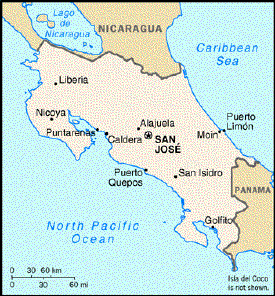Costa Rica is similar to many Latin American countries
when analyzing Hofstede's Dimensions (see Latin America
Hofstede Graph below).
Costa
Rica's highest Hofstede Dimension is Uncertainty
Avoidance (UAI) at 86, indicating the society’s
low level of tolerance for uncertainty. In an
effort to minimize or reduce this level of uncertainty,
strict rules, laws, policies, and regulations
are adopted and implemented. The ultimate goal
of this population is to control everything in
order to eliminate or avoid the unexpected. As
a result of this high Uncertainty Avoidance characteristic,
the society does not readily accept change and
is very risk adverse.
Costa
Rica diverges from other Latin countries on the
Power Distance (PDI) Dimension with the lowest
score of 35, compared to an average of 70 for
all Latin countries. This low Power Distance
Index for Costa Rica indicates a de-emphasis
in the society on a citizen’s power and
wealth, in other words, equality and opportunity
for everyone is stressed.
Costa
Rica also ranks lower on masculinity (21) than
other Latin countries (48) which indicates a
low level of differentiation and discrimination
between genders. In this culture, females are
treated more equally to males in all aspects
of society. This low Masculinity ranking may
also be displayed as a more openly nurturing
society.
Costa
Rica has a low Individualism (IDV) rank of 15,
as do most Latin countries. The score on this
Dimension indicates the society is Collectivist
as compared to Individualist. This is manifest
in a close long-term commitment to the member
'group', be that a family, extended family, or
extended relationships. Loyalty in a collectivist
culture is paramount, and over-rides most other
societal rules and regulations. The society fosters
strong relationships where everyone takes responsibility
for fellow members of their group.
In
many of the Latin American countries, including
Costa Rica, the population is predominantly Catholic
(see Religions Graph below). The combination
of Catholicism and the cultural dimensions shown
in the Hofstede Graphs above, reinforce a philosophy
predicated in the belief that there is an absolute ‘Truth”.
As Geert Hofstede explains about peoples with
a high Uncertainty Avoidance Index, their attitude
is, “There can only be one Truth and we
have it.” More Geert
Hofstede Details
Written
by Stephen Taylor , the Sigma
Two Group



